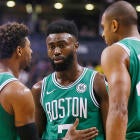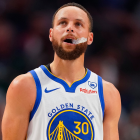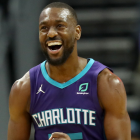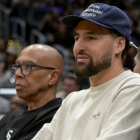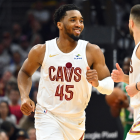As if the 2018-19 Boston Celtics haven't been dissected enough, Boston Celtics guard Marcus Smart offered some insight on what was going on behind the scenes. One of the most disappointing teams in recent memory, the Celtics entered the season with championship aspirations and ended it in disarray, dropping four straight games to the Milwaukee Bucks before Kyrie Irving, Al Horford, Marcus Morris and Terry Rozier left in free agency. When Smart looks back on the team, he sees a bunch of players dealing with personal issues.
"I think it was hard for everybody last year, including myself," he told Zach Lowe on ESPN's "The Lowe Post" podcast. "You know, I was dealing with my mom's passing, and everybody had their own little individual things that they were dealing with. Then when it came to the team, it was like, 'Oh, well. I got more things [that I'm] worried, stressed about that I need to be focused on right now individually."
Smart's mother, Camellia, died of cancer just before the season. Irving's grandfather, George Larson, died in October, and at Brooklyn Nets media day Irving described himself as depressed and withdrawn, saying that he "failed these guys in a sense" because he didn't give the team everything he had and didn't bring his former teammates together. Jaylen Brown recently told The Athletic's Jay King that he had anxiety and struggled with confidence during the season. According to Smart, many Celtics were fighting their battles alone, and it affected the team.
"You didn't know what anybody was going through," Smart told Lowe. "You was afraid to talk. You didn't know how to talk to anybody. Growing up as young men, you're always taught you don't want to show your emotions, you don't want to cry, and it's this stigma on it that, you know, as a man you're supposed to be manly, crying is not manly, talking about your feelings is not manly. When that's not true. That hurts. It hurts you in the long run. And mental health is a big issue in a lot of sports. And that was what was going on. Everybody was afraid to talk to one another because 1) we didn't know how, 2) we didn't know if the person we were talking to was going to understand or if they were willing to understand. And instead of putting ourselves out there, we just decided to hold it in."
In Brooklyn in late March, Morris said that he hoped there would be a "30 for 30" documentary on the team in 10 years. Back then, the implication was that they would turn things around in the playoffs, making the drama and dysfunction of the regular season look like necessary adversity. Given what actually happened, there is endless material for an eventual documentary, but it would be pretty sad.
Since the Bucks eliminated Boston, Irving has been the biggest scapegoat, but Gordon Hayward has taken plenty of criticism, too. Smart defended them, telling Lowe that the players were "forcing [Hayward] to do some things that he probably wasn't quite as confident as he is now to do," but it was out of love, and stressed that Irving was not the only player who didn't know how to deal with his problems last season. He also spoke glowingly about the Celtics' new vibe, saying that they have learned to talk to each other and have fun.
"I think last year just opened our eyes to the outcome of holding all that pent-up aggression or whatever you're going through inside, that it doesn't work for us," Smart said. "It's only going to bring us down, and everyone hated feeling down."
When a team underperforms to the degree this one did, there is never just one explanation. Irving's ups and downs, Hayward's rocky return from injury, the ambition of the younger players and the sheer number of playmakers were all factors and have all been discussed endlessly. But all teams face challenges like those, even if they don't face that many of them while under the intense scrutiny that comes with high expectations. The best ones manage to get past their problems, which typically involves the simple act of talking about them. Maybe in addition to asking how the season would have been different if Hayward were fully healthy, we should be asking how good Boston could have been if the players were able to communicate better.









